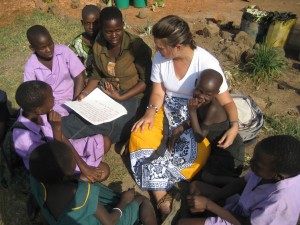
Devastation.
That is what BYU professor Warner Woodworth saw on CNN as Hurricane Mitch slammed Central America toward the end of 1998. Woodworth, an organizational leadership and strategy professor, was in Canada receiving an award when he saw the images of destruction in Honduras from the monster storm.
Woodworth prayed that night at his hotel and felt strongly that he should mobilize BYU students to help those affected by the storm. That feeling eventually led to the formation of HELP International, a nonprofit organization with nearly 200 volunteers providing resources to seven nations across the world.
The path to success was anything but easy. Opposition from campus officials and a rapidly changing industry were just some of the problems HELP had to overcome to succeed.
HELP is focused on providing economic support to those in poverty. Volunteers, a large number of whom are BYU students, work in countries like India, Uganda, Fiji and Thailand to provide a wide range of services to locals. HELP partners with nongovernmental organizations and nonprofits on the ground to identify needs and provide resources to those who are struggling.
“The organization utilizes individuals that were within their academic careers that had a fair amount of skill set, had intellectual capacity and some prior work experience,” said Mike Duthrie, the program’s current executive director. “(HELP) has taken those things and used them in developing economies to do something instead of just theorizing or talking about it.”
It was this drive among BYU students that led Woodworth to start the movement. He announced to his students in late 1998 that he would be starting a new NGO in January. He placed flyers around campus and hoped for the best. Only six students came the first day.
“Then students began mobilizing their friends and others,” Woodworth said. “The second class that first week had about a dozen students. By the next week we had 20-plus in the class. … We ended up with a class of 86 students even though only about half actually got university credit.”
The class worked hard to develop the program and plan the first visit to Honduras. Forty-six student volunteers flew down to provide service that first summer.
Student teams worked on fundraising, volunteer safety, business, Spanish, logistics, microcredit processes and more. The group raised $116,000 the first summer and established 800 microenterprises by providing small loans to those unable to receive traditional funding so they can start business ventures. In all, the group’s efforts benefitted more than 4,000 people.
At times, difficulties arose. According to Woodworth, bureaucracy and regulations made things difficult for a time. This required creative thinking to help the organization continue to grow.
“In my mind’s eye back then, I knew we could succeed over the long term,” Woodworth said. “HELP has exceeded my wildest expectations in some respects. … Thousands of (volunteers) have empowered the poor on the one hand and found more meaning in their own lives on the other.”
Almost 40 percent of current volunteers are BYU students. They are joined by help from schools like Duke, Notre Dame and the University of Washington.
The number and type of projects has also expanded. According to Arturo Fuentes, the organization’s program director, it currently helps in orphanages, provides teacher training, works with at-risk youth, develops therapeutic recreation programs, provides empowerment programs for young girls, coaches entrepreneurs, provides access to clean water and more.
“Looking at it, it’s easy to think, ‘You guys are spreading yourselves too thin,’ because we do a little bit of everything,” said Fuentes, a BYU graduate in Middle Eastern studies and Arabic. “But the way it’s able to work is with local partnerships. We bring in the human capital, the enthusiasm and funds.”
To stay relevant, the group continues to innovate and work with locals who know the area better than HELP volunteers do.
“We’re moving very heavily into working with in-country, localized partners rather than showing up and claiming that we know exactly what to do,” Duthrie said. “If our goals get too specific past that, it can start to impede on the natural solutions to poverty.”
He sees a future of success for the organization if it can continue to adapt to stay ahead of the game.
“We’ve learned a lot about what is expected of us as an organization,” Duthrie said. “It’s allowed our organization … to embrace the fact that we need to become better, so the vision and mission have stayed the same, but the way we have approached development is changing constantly.”




